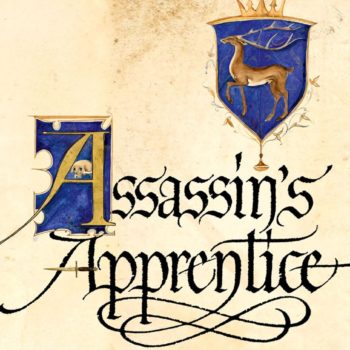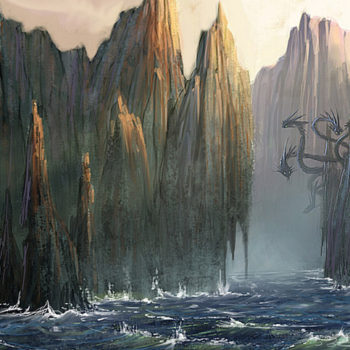
Wuxia Fiction and Urban Spaces: An Interview with Yilin Wang
- Posted by Augur Blog
- On August 28, 2019
- 0 Comments
- author interview, canadian author, wuxia novel
Interview by Tamara Jong
Writer Yilin Wang shares the inspiration for her fantasy story “Sparrow” published in Issue 145 of Clarkesworld. Her story was also recently named a runner-up in Sequestrum Magazine’s 2019 Editor Reprint Award and will be reprinted in one of their upcoming issues. Read on to find out what her revision process was, her thoughts on wuxia, book influences and the themes her collection of speculative fiction explores.
In “Sparrow” the protagonist is a young female drifter from Luo Dai working as a window cleaner whose job will soon be replaced by a robot, a not-so-distant worry. Scattered throughout the story are her recollections of the folktale about Sparrow Lee who stole from the rich and gave to the poor and whose (s)heroism gives her strength.
Yilin, I so enjoyed “Sparrow.” Since the story was told from a second person perspective it made me feel emotions along with the protagonist. In your interview with Brendan Davis on the Bedrock Podcast, you said that Sparrow was inspired by Sparrow Lee the Third. Similar to the Robin Hood legend, Sparrow Lee helped people—leaving paper sparrows behind— and kept their true identity hidden.
What was it about this legend that made you want to write your version and use the cities in the story as the setting?
I grew up listening to my grandpa’s stories about wuxia (martial arts fantasy) heroes, so I have always wanted to write stories that draw on these types of characters. “Sparrow” is inspired loosely by the folklore surrounding a figure whose name I translate as “Sparrow Lee the Third” (燕子李三). I find this legend uniquely compelling because, unlike many other heroes from Chinese and non-Chinese folklore, the identity of Sparrow is shrouded in mystery and unknowable. Sparrow, in a sense, can be anybody, and perhaps, Sparrow is more than a singular figure—they can stand for all everyone fighting for justice and against oppression. To me, the longing for Sparrow reflects a desire to believe in the possibility of everyday heroes and shows appreciation for the unsung heroes around us.
The feeling of anonymity that surrounds Sparrow is also appropriate for this story because it is a feeling experienced by many drifters and migrants, especially in urban spaces. I chose to set this story in Chongqing because I read a while ago in The Guardian that Chongqing is the fastest growing area in the world in terms of migrant workers. I lived there briefly as a child and know it well. This setting allows me to offer a glimpse of China beyond well-known cities like Beijing and Shanghai.
You’ve mentioned that as a writer, revision is a huge part of your process and that you had done about ten drafts of “Sparrow.” What are your tips for writers for tackling revision?
I always have a love/hate relationship with revision. It is a huge part of my process, and it always helps to make my work much better, but at the same time it can definitely be a struggle. My main tip is to think of revision as a process of “re-visioning.” Editing is more than changing a few words, making polishing edits, or proofreading for grammar. I like to go back and rethink each of my choices in terms of character, plot, and language, especially when working in concise forms like short fiction and poetry where every single word matters. You have to be open to making huge unexpected changes, to ask difficult questions of yourself and the work, to rewrite from a blank page if the work needs it. Let your revision surprise you.
You’re currently working on a novel inspired by Chinese folklore and wuxia literature. The research on the novel involved travelling to Mainland China and Hong Kong. On your Instagram, there is a picture you took of the Bamboo Sea, which was a giant forest of bamboo in Yibin, China and one of the film sites for Crouching Tiger, Hidden Dragon! At the Hong Kong Heritage Museum you interviewed the curator on Jin Yong’s influences and exhibits; at a martial arts studio you met someone who studied under the same master as Bruce Lee; had a martial arts lesson at a school in Mount Qingcheng; and visited the Hong Kong Public Library, where wuxia novels are archived along with authors’ notes, planning, and journals.
What was it like to be in all those places from books you’ve read and to view (or touch?) manuscripts of wuxia novels?
It was very inspiring and exciting to carry out my three-month research trip last summer (in 2018). I have spent the past three years immersing myself in the research of wuxia fiction and films, devouring some of the genre’s original Chinese classics, reading literary criticism essays about the genre and its translation into English, and analyzing common tropes and themes. But my research trip really complemented my research with first-hand experiences and observations. For writers, especially, it is helpful to see settings and conduct interviews. I gained numerous new ideas that will enrich my novel. It is very special to see some wuxia writers’ original manuscripts (with marginalia), visit temples and mountains that inspired legends and books, and talk to actual wuxia scholars and Chinese kungfu masters. I can go on and on about my trip, but I’m currently writing a longer essay about my trip, so I will save the details for my essay. It will appear later this year in carte blanche.
You interviewed Janie Chang, author of Dragon Springs Road (HarperCollins Canada), for Room Magazine’s Magic issue and in the preface it mentioned that her books were your travelling companions—that they transported you to periods that have long passed. There’s something about the physicality of books, isn’t there? Once, I slept with a book underneath my pillow when I was deciding if I should continue writing.
So, if you could choose any five books to take everywhere with you, which ones would they be and why?
Oh, this is a very challenging question! I really like the physicality of books, and I have a bit of a hoarding problem when it comes to them. The room where I live is filled with random stacks of books everywhere, especially because I often have to buy many obscure, out-of-print and second-hand Chinese books for research and for my reading interests (I can’t get hold of them otherwise).
If I must pick five, I would choose books that have influenced me a lot as a writer. Ken Liu’s The Paper Menagerie and Other Stories, Yiyun Li’s A Thousand Years of Good Prayers, volume one of Jin Yong’s Legend of Condor Heroes, volume one of Gu Long’s Two Peerless Heroes, and Xi Xi’s collection A Girl Like Me, and Other Stories.
I would also like to have with me an electronic copy of Taiping Guangji, also known as the Extensive Records of the Taiping Era, which is one of the most comprehensive collections of pre-Song dynasty Chinese folklore and supernatural tales.
With your journalism background, your freelance work including profiles, reviews, and interviews. What I love about doing interviews, is that it allows you to be in the writer’s world while you get to know their work through story and language.
What do you like best about interviewing and what writer would you love to interview (living or dead)?
It is always a pleasure to interview someone, especially a writer whose work I admire. I am very interested in discussions on craft and process, so I love the chance to chat with writers about those topics, as well as to learn more about the person and the inspiration behind their work.
As someone who is obsessed with wuxia fiction, I would love the chance to interview Jin Yong or Gu Long, who are both deceased. So, I have turned to the closest thing, which is reading their own journals, essays, marginalia, and past interviews. As for living authors, I would be so happy if I can one day interview some of my favourite writers, such as Ken Liu, Xi Xi, Patrick Rothfuss, Kim Thúy, or Xia Jia.
In the interview with “Team Magic” for Room’s Magic issue, in the question about what drew you to magic you mentioned that you were “delighted to help put together an issue that explores magic in all of its forms, at either end of the spectrum and throughout the gray areas in between.” How do your own stories play with this idea of magic?
I’m not a fan of somewhat divisive labels like “speculative/genre” and “literary” fiction, because these terms can come with assumptions about the work’s quality and status. When it comes to my writing, I try not to think about labels, but rather go where my stories and characters take me. A lot of my writing tends to resist categorization, blurring the lines of what is conventionally thought of as “speculative” and “literary.”
What was it like to be an assistant editor for this issue and were there any stories that surprised you?
I really enjoyed working with the Room team for Team Magic as an assistant editor. My main role was to serve as a second reader for the submitted stories and poetry assigned to me by the issue editor, Arielle Spence, as well as to conduct the featured interview with Janie Chang. I feel the issue covered a wide range of interpretations on the theme of magic, which is exciting, and it’s nice to see Room taking on the task of publishing more “speculative” and “genre” work.
You’re also at work on a collection of speculative fiction short stories. What are some of the themes your work explores?
I am very interested in topics such as folklore, urbanization, displacement, and heroism. I’m currently in the middle of editing and writing more stories for the collection, and I hope that one day readers can enjoy the stories and see the themes for themselves.
Recently you attended Norwescon in Washington and sat on panels such as Worldbuilding: Prints for a Better Planet, Decolonizing Your Fantasy World; Soul of the Warrior; Genres Without Borders. What did you enjoy about the panels and what was your takeaway from the conference?
This was my first time participating in a SFF convention as an attending professional and panelist, so it was a new and exciting experience. I loved chatting with my fellow panelists as well as meeting writers and editors I have long admired. Some of my personal highlights include talking to Neil Clarke, the editor at Clarkesworld who published my story “Sparrow,” about publishing and translation, as well as getting to hear Fonda Lee read a hilarious short story about superheroes. I also gained a lot of interesting and useful knowledge from the panels I attended. For example, I learned about ways to portray horses more realistically in fiction, medieval weaponry and armor in Europe, and medical practices in the ancient world.
Any upcoming speculative fiction authors with books coming out that you can’t wait to read?
I’m really looking forward to reading recently released titles like Descendant of the Crane by Joan He and The Walking Boy by Lydia Kwa. (I’m excited to interview Lydia for Augur Magazine soon!) Also, earlier this year, I was a backer for the Kickstarter for the first English-language collection of Xia Jia’s short stories, translated from a selection of her work in Chinese. I can’t wait to receive my copy of the book in the mailbox.
YILIN WANG is a writer, editor, and Chinese-to-English translator who has lived in China, the U.S., Scotland, and Canada. Her writing has appeared or is forthcoming in Clarkesworld, The Malahat Review, Grain, carte blanche, Contemporary Verse 2, Arc Poetry Magazine, LooseLeaf Magazine, Matador Network, The Tyee, The Toronto Star, Business Insider, and Best of Abyss & Apex Vol. 2. Yilin is a Creative Writing MFA candidate at UBC and has served as an assistant editor for Room issues 40.4 and 42.1. www.yilinwang.com / Find her on Twitter @yilinwriter.
TAMARA JONG is a Montreal-born mixed-race writer of Chinese and European ancestry. She is a graduate of The Writer’s Studio (Simon Fraser University) and part of the Room collective. Her work has appeared in Ricepaper, Room, carte blanche, The New Quarterly, Invisible Publishing and Body & Soul: Stories for Skeptics and Seekers. She is currently working on a collection of nonfiction stories. Find her on Twitter: @bokchoygurl.
LOVE THIS POST? Try this one!




0 Comments